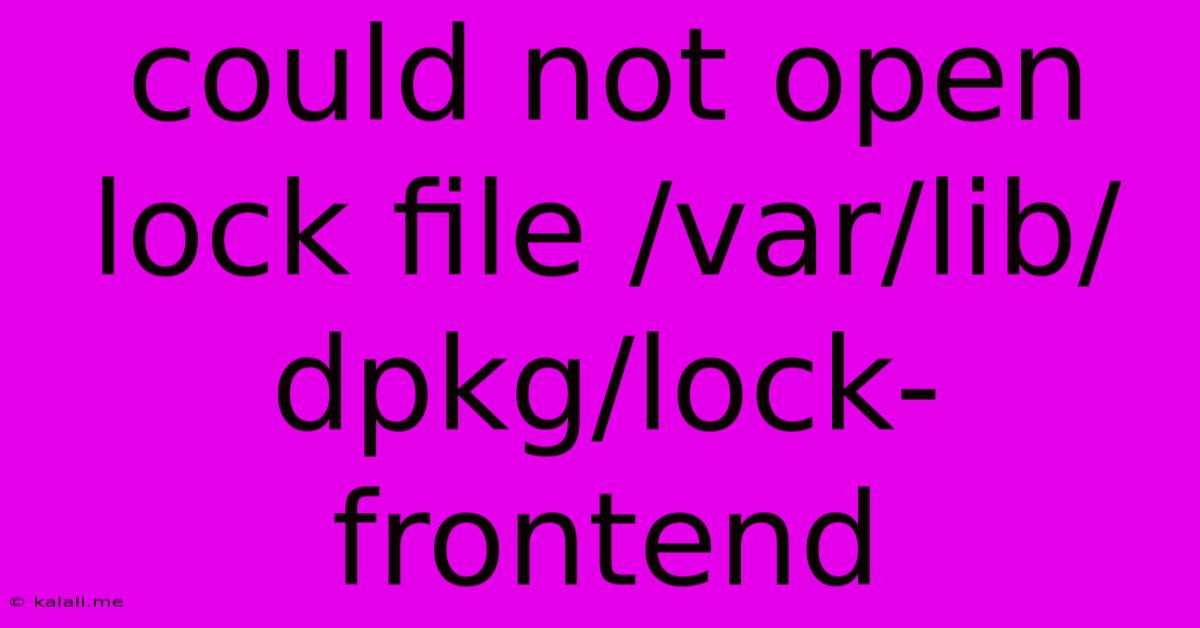Could Not Open Lock File /var/lib/dpkg/lock-frontend
Kalali
May 31, 2025 · 4 min read

Table of Contents
Could Not Open Lock File /var/lib/dpkg/lock-frontend: Troubleshooting and Solutions
The dreaded "Could not open lock file /var/lib/dpkg/lock-frontend" error message is a common headache for Linux users, particularly those working with Debian-based systems like Ubuntu, Linux Mint, and Pop!_OS. This error typically prevents you from installing, upgrading, or removing packages using the apt or dpkg command-line tools. This comprehensive guide will explore the root causes and provide effective solutions to resolve this frustrating issue.
What causes this error? The error message indicates that another process is currently using the dpkg package manager. This lock file ensures that only one process can modify the system's package list at a time, preventing conflicts and data corruption. However, several scenarios can lead to this lock file being held:
- A previous package installation or removal that failed to complete: A sudden power outage, system crash, or interrupted command can leave the lock file in place, preventing further actions.
- A running process utilizing
dpkgorapt: Background updates, software installations, or even a user inadvertently running a related command can keep the lock file engaged. - A corrupted lock file: In rare cases, the lock file itself might become corrupted, preventing access even when no other process is actively using it.
- Permissions issues: Unusual file permissions on
/var/lib/dpkgcan also contribute to this problem.
Effective Solutions to Resolve the Lock File Issue:
Here are several troubleshooting steps you can take to resolve the "Could not open lock file /var/lib/dpkg/lock-frontend" error:
1. Identifying and Terminating Conflicting Processes
The most common cause is a stalled process. Let's identify and terminate it:
-
Check for running
aptordpkgprocesses: Open your terminal and run the following command:ps aux | grep [a]ptandps aux | grep dpkg. Look for processes usingaptordpkgthat might be stuck. Note their Process ID (PID). -
Terminate the process: If you find a stuck process with a PID (e.g., PID 1234), terminate it using the
killcommand:sudo kill 1234. If this doesn't work, trysudo kill -9 1234(this is a forceful kill, use cautiously). Remember to replace1234with the actual PID.
2. Releasing the Lock File Manually
If terminating processes doesn't work, you can try manually releasing the lock file. Use caution when performing this step; incorrect usage can potentially damage your system.
- Remove the lock file: Use the following command, but be aware that this is a last resort and should be done only if you're certain no other process is actively using
dpkg:sudo rm /var/lib/dpkg/lock-frontendandsudo rm /var/lib/dpkg/lock. Then retry youraptordpkgcommand.
3. Checking and Repairing Package Databases
A corrupted package database can also cause this issue. Let's check and repair it:
- Update the package cache: Run
sudo apt updateto refresh the package lists. This often resolves minor inconsistencies. - Repair the package database: If the update doesn't work, try repairing the package database using
sudo apt-get -f install. This command attempts to fix broken dependencies and resolve inconsistencies.
4. Addressing Permission Issues
Though less common, permission problems can sometimes block access to the lock file.
- Check file permissions: Use
ls -l /var/lib/dpkgto check the permissions of the/var/lib/dpkgdirectory. Ensure that the root user has read, write, and execute permissions. If not, adjust them usingsudo chmod 755 /var/lib/dpkg.
5. Rebooting the System
A simple system reboot can often resolve temporary issues that prevent the release of the lock file.
Prevention Strategies
To prevent encountering this error in the future, consider these best practices:
- Avoid interrupting package management operations: Let package installations and updates complete without interruption.
- Regularly update your system: Keep your system updated to minimize the chance of encountering outdated or conflicting packages.
- Use
sudoappropriately: Always usesudowhen running commands that require administrator privileges.
By following these troubleshooting steps and incorporating preventive measures, you can effectively overcome the "Could not open lock file /var/lib/dpkg/lock-frontend" error and maintain a stable Linux system. Remember to always back up your important data before making significant system changes.
Latest Posts
Latest Posts
-
Two Lights One Switch Wiring Diagram
Jun 02, 2025
-
Cat All Files In A Directory
Jun 02, 2025
-
2 To 1 Mux Truth Table
Jun 02, 2025
-
Why Is My Stained Wood Sticky
Jun 02, 2025
-
What Did Hezekiah Do With His 15 Years
Jun 02, 2025
Related Post
Thank you for visiting our website which covers about Could Not Open Lock File /var/lib/dpkg/lock-frontend . We hope the information provided has been useful to you. Feel free to contact us if you have any questions or need further assistance. See you next time and don't miss to bookmark.